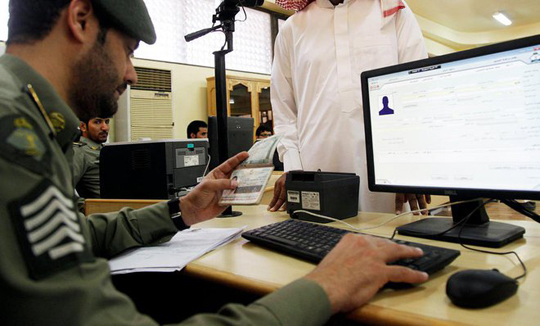Riyadh, Mar 2: Four government ministries have agreed to link their systems electronically to facilitate issuing new visas to investors within 24 hours.

Al-Eqtisadiya newspaper quoted the Foreign Ministry’s head of media Osama Nugali as saying: “The agreement was reached to link the Ministry of Foreign Affairs electronically to the Ministry of Interior, the Ministry of Commerce and Investment, and the Ministry of Labor and Social Development by supplying the Ministry of Foreign Affair’s visa system with information and data needed to facilitate and speed up the process for issuing visas.”
He said the agreement also extends to the General Investment Authority to provide the Foreign Ministry with a list of approved establishments to facilitate their requests via the Kingdom’s missions abroad.
Nugali added that based on the agreement, the Kingdom’s missions have been approved to issue business visas to those wishing to come to the Kingdom to explore investment opportunities. He said applications do not need to be accepted from an authority in the Kingdom, and visas can be directly issued from embassies. Upon confirming the status of the application and approving it, visas will be issued within 24 hours from the time of receipt of the passport.
“These facilities also include commercial visits by individuals who hold commercial or business status, both men or women, and heads of foreign companies, regardless of titles. Representatives of companies coming on the basis of an invitation from a company in the Kingdom for a meeting with counterparts are also included,” he said.
The Kingdom’s embassies abroad have also been tasked with monitoring and evaluating the performance of visa service offices in host countries, and approving and ensuring these offices hand over the visa and passport on the same day, or within 24 hours from the time the application is made and documents are received.
Nugali said these developments are in line with Vision 2030 and based on the decision of Prince Mohammed bin Salman — deputy crown prince, second deputy prime minister, defense minister and chairman of the Committee for Economic and Development Affairs — to establish a committee to oversee process improvement in the private sector and incentivize participation in economic development.
The committee, chaired by the Ministry of Commerce and Investment, is responsible for facilitating the process of obtaining business visas through active participation of all concerned sectors and parties.
Al-Eqtisadiya reported in January that the Foreign Ministry adopted a mechanism to facilitate and speed up business and investment visa issuance procedures through electronic systems. This would allow foreign investors to visit the Kingdom and review investment opportunities more easily.
Under the new system, business visas have been classified into three groups: Business visit visas to a company operating in the Kingdom, business visas, and commercial delegation visit visas.
Application of the decision to issue commercial visas to businessmen and commercial delegations began on Jan. 1, 2017, Al-Eqtisadiya reported, while issuance of visas to visit commercial establishments in the Kingdom is set to begin in the coming days.





Comments
Add new comment